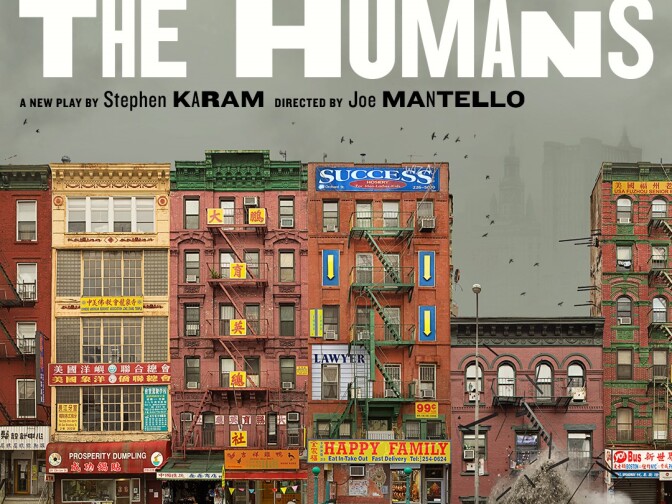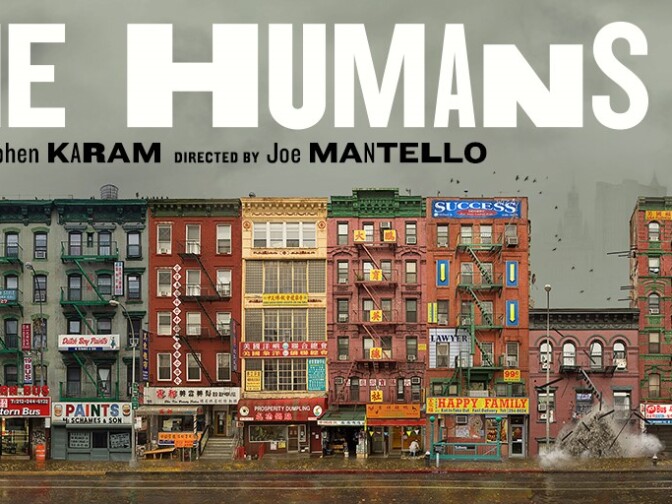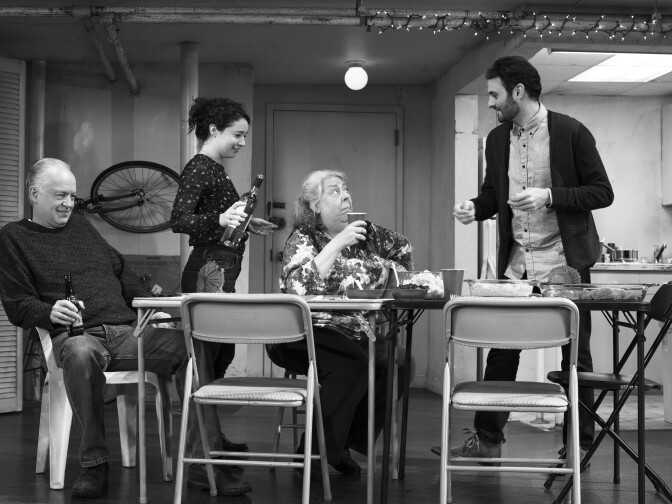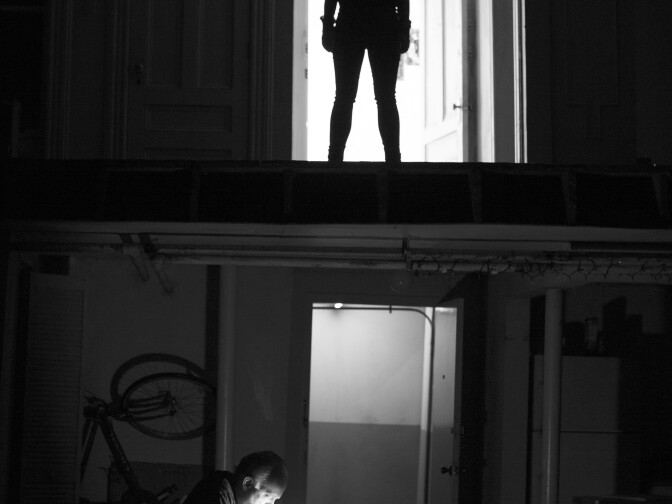Playwright Stephen Karam tells the story of making "The Humans" a Broadway hit; "Hamilton" broke a Tony nomination record and Broadway proves more diverse than Hollywood; Anybody who's anyone in the digital media world is making online videos, so what's hot at the Newfronts?
'The Humans': Tony-nominated play gets real about family
Ever had a really bad family dinner? Maybe you should make a play out of it.
That's part of what inspired Stephen Karam to write "The Humans," a drama that unfolds over a Thanksgiving dinner.
Three generations of a family, plus a potential son-in-law, gather in a dingy New York apartment, not so much to break bread but to cross swords. There are plenty of laughs in the show, but “The Humans” is ultimately a serious look into what binds a family together — and what tears it apart.
"The Humans" was a finalist for the Pulitzer Prize (it lost to "Hamilton"), and it's currently playing to packed houses at the Helen Hayes Theater in New York. Today it received six Tony nominations including a nod for Best Play.
When The Frame's John Horn spoke with Karam, the playwright espoused the value of day jobs because "they allow us to be fearless in our writing" and the joy of having a Broadway hit without being a musical spectacle.
Interview Highlights:
I want to go back to a moment, more than a year ago, when "The Humans" was just starting its run at an off-Broadway theater — it had yet to be reviewed, and Scott Rudin, a movie producer who might be best known [in theater circles] for producing "The Book of Mormon," came to see your play. What happened next?
He saw a Sunday matinee before the show had even opened. We were in the last week of previews before press would start arriving, and I got a call saying he'd seen the show and liked it very much. That was a good feeling. Then there was another call, maybe a day later, saying that Scott was interested in moving the show to Broadway. [laughs]
That was certainly unprecedented in my own career, but for anyone in the industry, for a play with no stars or reviews to have someone aspire to move it to Broadway was astonishing.
I think I was even a little skeptical, like, This can't possibly be true. But it was all true — Scott had put down a deposit and the wheels were already spinning before we had even had our opening night. I don't know that I'll ever have an experience like that again.
Not only were you incredibly well-reviewed once you moved to Broadway, but also, when I saw the show, there was not an empty seat in the house. You're doing incredible business while going up against shows like "Hamilton" or "Book of Mormon," so what's the different satisfaction of seeing the full houses in addition to the great reviews?
My family's already seen the show, so part of me is astonished. Who are these people coming to see the show night after night? [laughs] I'm a fan of musical theater, so it's been heartening to see that people really do still have an appetite to see a good, well-told story that has a similar chance of taking them on a ride that's just as powerful as a show like "Aladdin" or "Hamilton."
I think there's this myth that a play without a celebrity star or a celebrity playwright can't survive on Broadway, and I think it's been exciting to see that none of those rules actually exist.
I think one of the things that's notable about the play is that even though it's dealing with some difficult issues, it's really funny. Was that your intention in writing it? Did you anticipate how funny it would play, or are you constantly surprised by how light the audience takes a lot of the story?
None of it is necessarily intentional, but I do think that people and life in general are hilarious and entertaining, and I also think life's sad and dark and complicated and a little scary. [laughs] So I don't know that I'll ever write a play that doesn't have a lot of laughs, because that's just where I live, so it's where my writing lives.
You wrote "Speech and Debate" in your 20s. Do you remember the day or the week when you realized that you could support yourself as a playwright and not have a day job?
[laughs] That's an interesting question. There wasn't an exact moment, only because I held onto my day job for a very, very long time. "Speech and Debate" opened and closed and I was still working as an administrative assistant at a Canadian law firm here in the city, and I was there for about seven years.
It was 30 hours a week, and I quickly discovered that the security that that job was giving me allowed me to take more risks as a writer. I knew it was okay if "Speech and Debate" flopped, or if my next play had been a flop, and that created its own kind of excitement for me.
I stuck with that job until I opened "Sons of the Prophet" and only left because I didn't have enough vacation days to cover everything. I'd written a libretto for a chamber opera, and the timing of that production plus "Sons of the Prophet" opening in Boston meant that I didn't have enough vacation days to participate in these projects.
So I only left when I didn't really have an option, and then "Sons of the Prophet" ended up doing pretty well. For better or worse, here I am as a playwright without a day job. [laughs] But there's a part of me that thinks all playwrights should have day jobs, if they allow us to be fearless in our writing.
'Hamilton,' 'Eclipsed' and more shine at 2016 Tony nominations
The "Hamilton" train just keeps on rolling.
The musical has already won a Grammy and a Pulitzer, and now it's set to dominate the 2016 Tony Awards. This morning it was announced that "Hamilton" received a record-setting 16 nominations for this year's Tonys, breaking the record previously held by "The Producers."
Of course, there's more happening on Broadway than just "Hamilton." Jesse Green, theater critic at New York Magazine, joined us to break down the rest of this year's Tony nominees. (The awards ceremony is scheduled for June 12.)
Interview Highlights:
"Hamilton" set a record with 16 Tony nominations. Could it actually have gotten more? Was there a category where it was snubbed?
No, it got a nomination in every single award it was up for, and I feel certain that if it had been up for some other category that has yet to be invented, it would have been nominated there as well.
Most expensive tickets on Broadway? [laughs] The record for the most wins is held by "The Producers," which won 12 back in 2001. Could "Hamilton" win that many or more? In some categories, like "Featured Actor in a Musical," it has multiple nominations.
It's still possible, since it's nominated in 13 separate categories, so if it won one of the awards in each of those categories, then it would beat "The Producers." But that's highly unlikely.
Because it has to sweep?
Yeah, and there are a lot of other shows around and I think the voters are going to feel like sharing some of the joy and money with them, even in a year that has quite a juggernaut of a show. No one's doubting that "Hamilton" will have a very long life and will win most of the big awards that it's up for, but I think there's going to be room for some of the less famous categories to go to other players.
http://a.scpr.org/i/6197a0067de33550da57dec8e75dbcfc/126346-six.jpg
(Lupita Nyong'o stars in "Eclipsed," for which she was nominated for a Tony. Image courtesy of Getty Images.)
Out here in Hollywood, we've spent a lot of time talking about #OscarsSoWhite. But there's a recent study of theater casting — not just Broadway — and it found that during last year's season, about 30% of the roles went to actors of color. Among this year's Tony nominations, was there a pretty diverse group of performers?
Yeah, that statistic comes from the previous season, and this season is even better for diversity. That's definitely represented among the nominees, which I'm sure is giving the Broadway community quite a collective feeling of schadenfreude vis-a-vis the Hollywood community. [laughs]
We've got "Eclipsed," which stars Lupita Nyong'o and has an entirely black, female cast; we have a revival of "The Color Purple" with a stunning lead performance by Cynthia Erivo, who may win one of those awards away from "Hamilton"; and we've got several other shows with leading characters of color or who represent other kinds of diversity.
Was there any one nomination that really gratified you — a performance, a play, something that might have slipped under the radar but that got recognition from the Tony nominators?
I'm glad to see that Laura Benanti, the star of "She Loves Me" — which is a revival of the classic, golden age musical — was nominated in the Leading Actress category. I don't know how much of a surprise it was, but there were a lot of possibilities in that category.
Also, there's a show called "Disaster" — I was not a fan of the show, which is a spoof of disaster movies and disco music. [laughs] To me, it's not a great combination, but Jennifer Simard, who's a known quantity here in New York, but not very famous, plays the drunk nun character that you might imagine in such a show. She steals the show and she got nominated for a Featured Actress Tony award. She's unlikely to win it, but you never know.
I think every musical needs a drunk nun character.
[laughs] Yes, and every convent.
Newfronts: Digital media companies converge to woo advertisers
This week, everybody who is anybody in the digital media world is in New York for an event called the Newfronts.
Much like the broadcast TV Upfronts, the Newfronts are an opportunity for creators to sell ad spots to brands that want to get in front of anyone who consumes content online.
Natalie Jarvey, a staff writer covering digital media for the Hollywood Reporter is at the presentations. We got her on the line and asked her to explain what the Newfronts are and how they’re changing the ad-buying game.







